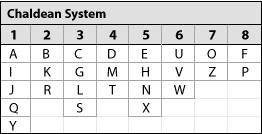Numerology is the ancient study of numbers. The word ‘Numerology’ was created from the Latin word ‘numerus’ (number) and the Greek word -‘logia’, from ‘logos’ (meaning word, thought, and expression).
Each letter of the alphabet has a numerical value, and each number has a related cosmic vibration. Combining the letters in your name and the date on which you were born provides an interrelation of vibrations. This unique and personal combination allows for insight as to your character tendencies, strengths and weaknesses, natural talents, motivations, and life purpose as an integral part of the cosmic plan. Numerology is one of many tools used to gain insight and understanding into one’s Self and others.
History of Numerology
The roots of numerology date back thousands of years, and variations of it can be found in most cultures throughout history. While many people dismiss it as a pseudoscience, it has been taught and studied by some of the most respected mathematicians throughout history.
It’s generally accepted that the ancient cultures of China, Japan, India, Babylon, and Egypt were familiar with numerology long before the Greeks and Romans began using it, but most books still credit Pythagoras as being the ‘father of numerology.’
Pythagoras, Greek mathematician and philosopher (569-470 B.C.), believed that reality is mathematical. He viewed the entire universe as being composed of mathematical patterns and was adamant that all things can be expressed in numbers that correspond to energy patterns of vibrations.
The teachings of Pythagoras were adopted by the notable Socrates and Plato and studied by early Christian scholars, including St. Augustine. This ultimately led to the expansion of numerology during the Renaissance, and it continues to be studied and practiced today.
Types of Numerology
There are a variety of different types of numerology systems available for study. The Chaldean, the Pythagorean (Western), and the Kabbalah are three of the most popular numerological systems in use today. Each of these systems calculates numbers differently and offers different interpretation of one’s life.
Chaldean Number System
The Chaldean Numerology system has its roots in Ancient Babylon and is probably the oldest known system of numerology. In this system, the numbers assigned to the letters are not determined by alphabetical order (as the Pythagorean method), but rather by the vibration of each specific letter.
Chaldean Numerology uses a number formula based on calculating 1 to 8 with no alphabet letter assigned to the number 9. The reason for this is that the Chaldeans considered the number 9 as a holy or sacred number; therefore, it is kept apart from other vibrations, except when it results as the final sum.

Pythagorean (Western) Number System
The Pythagorean Numerology system is said to have originated from the Greek mathematician Pythagoras, who is best know for his solution for the hypotenuse of a right triangle (a2 + b2 = c2).
Pythagorean Numerology is the most popular numerology system used today. This number system assigns the number value by the sequence of the Western alphabet and uses a number formula based on calculating 1 to 9.

Kabbalah Numerology
The Kabbalah Numerology system originated in Hebrew mysticism. The Kabbalah number system only analyzes the name. This system has assigned twenty-two vibrations ranging from 1 to 400. Since this system only analyzes the name and not the birth date, it is not widely used among Numerologists.
To learn more about your personal numbers and to find out how you can obtain a Numerology Report, visit our Numerology Center.










